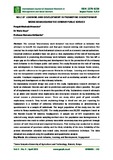| dc.contributor.author | Mwandoe, Pongah Meshack | |
| dc.contributor.author | Guyo, Wario | |
| dc.contributor.author | Otieno, Romanus Odhiambo | |
| dc.date.accessioned | 2018-11-21T16:08:48Z | |
| dc.date.accessioned | 2020-02-07T08:38:22Z | |
| dc.date.available | 2018-11-21T16:08:48Z | |
| dc.date.available | 2020-02-07T08:38:22Z | |
| dc.date.issued | 2015 | |
| dc.identifier.citation | Mwandoe, P. M., Guyo, W., & Odhiambo, R. (2015). Role of learning and development in promoting discretionary work behaviourin the Kenyan Public Service. International Journal of Advanced Research in Management and Social Sciences, 4(4), 142-169. | en_US |
| dc.identifier.uri | http://repository.must.ac.ke/handle/123456789/1243 | |
| dc.description.abstract | The concept ‘discretionary work behavior’ has been defined as behavior that attempts to benefit the organization and that goes beyond existing role expectations.The concept has its origin both from behavioral sciences as well as economic conceptualizations. Empirical evidences available have not given a clear explanation of the role of learning and development in promoting discretionary work behavior among employees. This has left a major gap on the influence learning and development has in the promotion of discretionary work behavior in the Kenyan public civil service.This study focused on the role of learning and development in Promoting discretionary work behavior in the Kenyan Public service, with specific reference to the government Ministries in Kenya. Learning and development was the independent variable while employee discretionary behavior was the Independent variable. Employee engagement was considered as well as mediating variable on effect of learning and development on discretionary behavior. An explanatory research design was used in this study. Explanatory research attempts to build on elaborate theories and add to predictions and principles where possible. The goal of all explanatory research is to answer the question of why. Explanatory research attempts to go above and beyond what exploratory and descriptive research do by identifying the actual reasons a phenomenon occurs. There are many other goals of good scientific exploratory research. They include explaining things in detail and not just reporting An Explanatory is a method of collecting information by interviewing or administering a questionnaire to a sample of individuals. The target population of the study was the civil service in Kenya numbering 217,000. The study population was 26,000 employees based at the Nairobi County 18 ministry Headquarters. A sample size of 379 respondents was selected using simple random sampling method since the population was homogeneous. A questionnaire was used to collect primary data while secondary data was gathered through reviews of both theoretical and empirical literatures. Pilot testing was conducted to obtain some assessment of questions validity and the likely reliability of the data. Reliability of the pretest observation schedule was tested using internal consistency technique. The data obtained was analyzed using the qualitative and quantitative analysis. | en_US |
| dc.language.iso | en | en_US |
| dc.publisher | GreenField Advanced Research Publishing House | en_US |
| dc.subject | Discretionary work behavior, Learning and Development, Engagement | en_US |
| dc.title | Role of learning and development in promoting discretionary work behaviourin the Kenyan Public Service | en_US |
| dc.type | Article | en_US |

